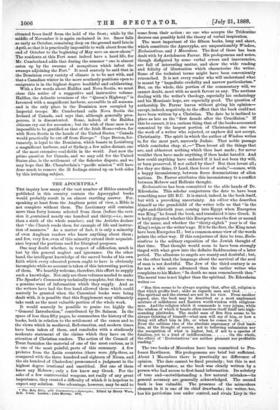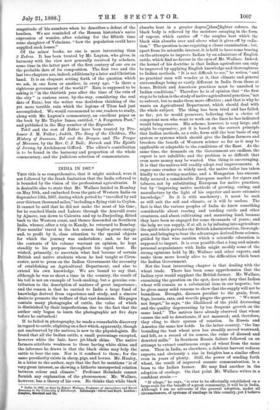THE APOCRYPHA.* THE inquiry how many of the vast number
of Bibles annually published in this country contain the Apocryphal books would probably result in an almost startling answer. For, speaking at least from the Anglican point of view, a Bible is not complete without them. The Lectionary still contains more than forty lessons selected from them (before the revi- sion it contained nearly one hundred and thirty,—i.e., more than a sixth of the whole number), and the Articles declare that " the Church reads them for example of life and instruc- tion of manners " As a matter of fact, it is only a minority of even Anglican readers who know anything about them; and few, very few, even of this minority extend their acquaint- ance beyond the portions used for liturgical purposes.
One may doubt whether, in respect of edification, much is lost by this general neglect and ignorance. On the other hand, the intelligent knowledge of the sacred books of his own faith which every educated person ought to have is obviously incomplete while no account is taken of this interesting portion of them. We heartily welcome, therefore, this effort to supply such a knowledge. Not only are these volumes needed to make The Speaker's Commentary technically complete, but there was a genuine want of information which they supply. And as the writers have had the free hand allowed them which could scarcely be granted when the Canonical books were being dealt with, it is possible that this Supplement may ultimately take rank as the most valuable portion of the whole work.
It would scarcely be possible to praise too highly the " General Introduction," contributed by Dr. Salmon. In the apace of less than fifty pages, he summarises the history of the books, both in relation to the settlement of the canon and to the views which in mediaeval, Reformation, and modern times have been taken of them, and concludes with a studiously moderate statement of the claims which they have on the attention of Christian readers. The action of the Council of Trent furnishes the material of one of the most carious, as it is one of the moat painful, parts of this summary. A few prelates from the Latin countries (there were fifty-three, as compared with the three hundred and eighteen of Nica3a, and the six hundred of Chalcedon) pronounced a judgment in the highest degree irrational and uncritical. Not one of them knew any Hebrew ; only a few knew any Greek. For the sake of a few controversial weapons, not really of any great importance, they created a difficulty of which it is hopeless to expect any solution. One advantage, however, may be said to • The Holy Bale, sill, Cononentary.—Apeerypha. Edited by Henry Wage, D.D. 2 role. London John Murray. 18%.
come from their action : no one who accepts the Tridentine decrees can possibly hold the theory of verbal inspiration. The most important of the fifteen books, long and short,
which constitute the Apocrypha, are unquestionably Wisdom, Ecclesiastieus, and 1 Maccabees. The first of these has been
dealt with by Archdeacon Farrar. His prolegomena and notes, though disfigured by some verbal errors and inaccuracies, are full of interesting matter, and show the wide reading and felicity of illustration which characterise the writer. Some of the technical terms might have been conveniently retrenched. It is not every reader who will understand what is meant by " haga,distic credulity and narrow particularism.* But, on the whole, this portion of the commentary will, we cannot doubt, meet with as much favour as any. The sections dealing with the writer's theology, especially his eschatology
and his Messianic hope, are especially good. The question of authorship Dr. Farrar leaves without giving his opinion—
except, indeed, negatively, to the effect that the book could not have been written by a Christian. The date he is inclined to place as late as the "first decade after the Crucifixion." If this be correct, His a curious thing that of the books accounted canonical by the largest portion of Christendom, one was the work of a writer who rejected, or anyhow did not accept,
Christianity. The spirit in which the author of Wisdom writes
is, for the most part, narrowly Judaic. That noble passage which concludes chap. xi.,—" Thou lovest all the things that are, and abhorrent nothing which thou hast made ; for never wouldst thou have made anything, if thou hadst hated it. And how could anything have endured if it had not been thy will, or been preserved, if not called by thee P But thou lovest all; for they are thine, 0 Lord, thou lover of souls,"--com.ea, -with a happy inconsistency, between fierce denunciations of alien nations. Dr. Farrar attributes this inconsistency to a conflict between Hebrew and Hellenic thought.
Ecclesiasticus has been committed to the able hands of Dr. Edersheim. This scholar conjectures the date to have been something near 235 B.C. It is stated, indeed, in the book itself, but with a provoking uncertainty. An editor who describes
himself as the grandchild of the writer tells us that "in the eight-and-thirtieth year, coming into Egypt when Energetes was King," he found the book, and translated it into Greek. It is hotly disputed whether this Energeteswas the first or second of the name, and whether the "thirty-eighth" year is of the King's reign or the writer's age. If it be the first, the King must have been Energetes II.; but a common-sense view of the words
points the other way. If this conjecture of date be true, Ecele- siasticus is the solitary exposition of the Jewish thought of that time. That thought would seem to have been strongly
tinged with what grew into the definite Sadduceeism of a later period. The allusions to angels are scanty and doubtful ; but, on the other hand, the language about the survival of the soul of man is not doubtful. The Jew of the third century is so far not a whit more advanced than the earlier writer who complains to his Maker, " In death no man remembereth thee." The moral tone is not higher than the spiritual. Dr. Edersheim writes
Ben Sin, seems to be always arguing that, after all, religion is that which profits best ; alike as regards man and God The spiritual and the eternal are not in his view. From' another aspect, also, the book may be described as a most unpleasant mixture of selfishness and Eastern world-wisdom with religious- ness. And the religion which it commends is very jejune, while the wisdom of which it boasts often resolves itself itself into high- sounding platitudes. The model man of Ben Sirs seems to be always thinking of himself—what men will say of him, or how a
thing will affect him in life, or when he comes to die Even the sublime idea of the absolute supremacy of God leads him, at the thought of sorrow, not to believing submission nor the recognition of what is higher, but, if not to a species of fatalism, yet to a kind of indifferentism On the whole, the ethics of Ecelesiasticus ' are neither pleasant nor profitable reading."
The two books of Maccabees have been committed to Pro- fessor Rawlinson. His prolegomena are brief but sufficient. About 1 Maccabees there is practically no difference of opinion. The date cannot be fixed precisely ; but this is not
of much importance, as the book was clearly written by a person 'who had access to first-hand information. Its sobriety of tone and—notwithstanding a few natural mistakes—its general accuracy are generally acknowledged. The second
book is less valuable. The presence of the miraculous element in it is one of its chief drawbacks; the writer, too,
has his patriotism less under control, and rivals Livy in the magnitude of his numbers when he describes a defeat of the heathen. We are reminded of the Roman historian's naive expression of wonder, after relating for the fiftieth time some slaughter of Volscians, " how the population could have supplied such losses."
Of the minor books, no one is more interesting than 2 Esdras. It has been treated by Mr. Lupton, who gives, in harmony with the view now generally received by scholars, some time in the latter part of the first century of our era as the probable date of its composition. The first two and the last two chapters are, indeed, additions by a later and Christian hand. It is an eloquent setting forth of the question which we ask, in one form or another, in every age, " Is there a righteous government of the world ?" Ezra is supposed to be asking it " in the thirtieth year after the time of the ruin of the city " (a curious error, by-the-way, considering the real date of Ezra), but the writer was doubtless thinking of the yet more terrible ruin which the legions of Titus had just accomplished. We would recommend to our.readers to study, along with Mr. Lupton's commentary, an excellent paper on the book by Mr. Taylor limes, entitled, " A Forgotten Poet," and published in the May number of the Expositor.
Tobit and the rest of Esther have been treated by Pro- fessor J. M. Fuller.; Judith, The Song of the Children, The History of Susanna, Bel and the Dragon, and The Prayer of Manassa, by the Rev. C. J. Ball ; Baruch and The Epistle of Jeremy, by Archdeacon Gifford. The editor's contribution is to be found in the harmony and proportion of the whole commentary, and the judicious selection of commentators.



































 Previous page
Previous page